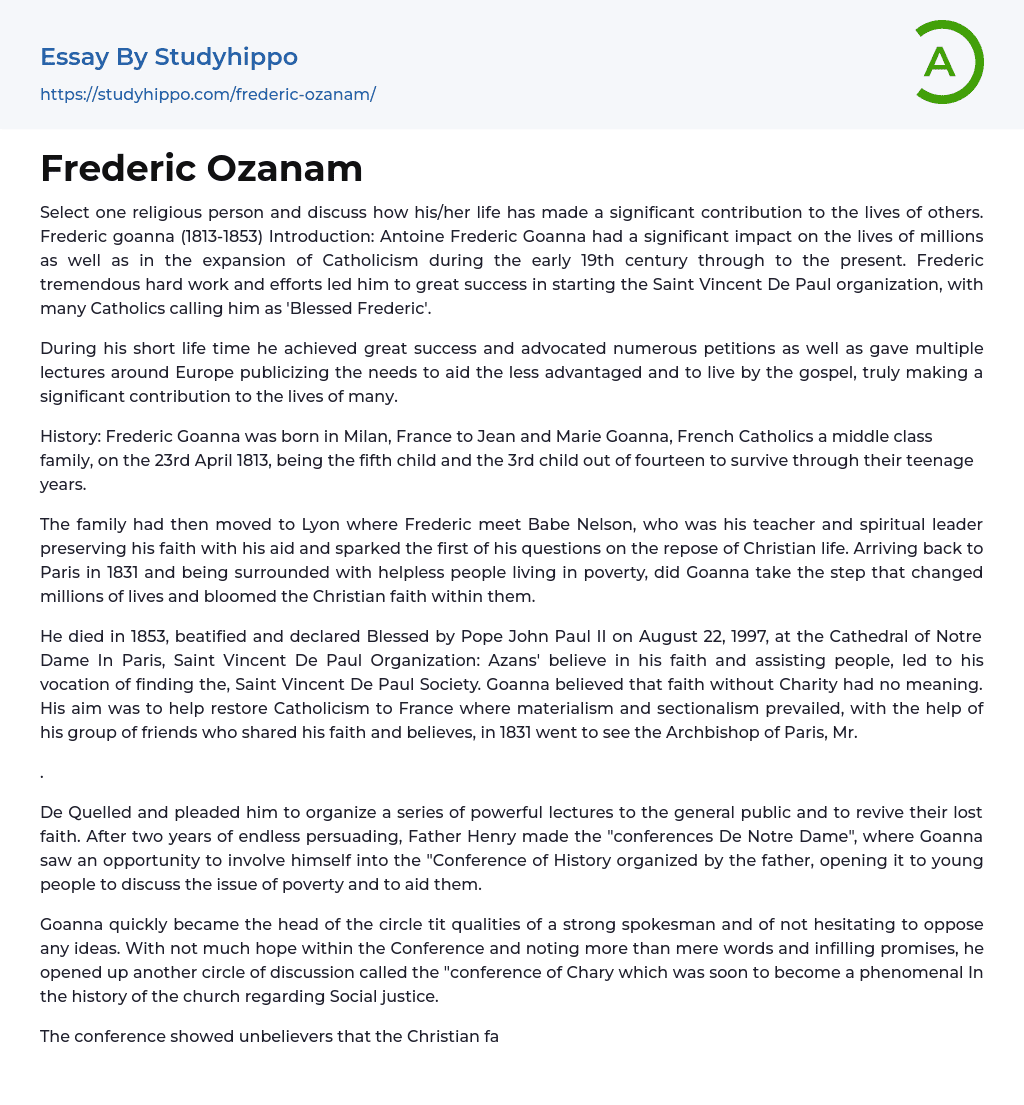Discussing the life of a religious figure who has made a significant contribution to the lives of others, Antoine Frederic Goanna (1813-1853) stands out. Goanna played a monumental role in expanding Catholicism during the 19th century and beyond. Best known for founding the Saint Vincent De Paul organization, he is widely referred to as 'Blessed Frederic'. In a life cut short, his tireless work and persistent efforts facilitated various petitions and lectures across Europe advocating for the less fortunate. Goanna's success and influence continue to bear fruit to this day. Born into a middle-class French Catholic family in Milan in 1813, Goanna was the fifth child and third survivor out of fourteen siblings. He first received spiritual guidance from his teacher, Babe Nelson, after moving with his family to Lyon. This mentorship sparke
...d his interest in Christian faith and challenged him to question the repose of Christian life. Upon returning to Paris in 1831, he encountered pervasive poverty and set on a path that would change millions of lives and inspire the Christian faith within them.Blessed by Pope John Paul II on August 22, 1997 at the Cathedral of Notre Dame in Paris, he died in 1853. Saint Vincent De Paul Organization: Azans' faith and devotion to helping people led to him founding the Saint Vincent De Paul Society. Goanna believed that faith was pointless without charity and wished to restore Catholicism to France where materialism and sectionalism loomed. In 1831, he and his friends went to the Archbishop of Paris, Mr. De Quelled, begging him to organize impactful lectures to rekindle the lost faith of the public. After two years of persuasion, Father Henry
made the "conferences De Notre Dame" where Goanna joined the "Conference of History" discussions focused on poverty. He quickly became a strong spokesman and headed the circle, unafraid to oppose ideas. Disappointed with empty promises, he opened another discussion group called the "conference of Chary" which became a significant aspect of church history regarding social justice.
The Christian faith, as demonstrated at the conference, is inherently active and supportive of its members. Charity is seen as a powerful expression of love, and believers view the suffering of the poor as a tangible manifestation of their faith. Inspired by this belief, the Saint Vincent De Paul Society was formed under Azan's leadership in 1833. The core philosophy of the Society was to provide practical support to those living in poverty, through personal visits, offering friendship and aid, as well as providing free fuel for heating homes in Paris slums. Within a decade, the Society had grown rapidly across France and Italy, with over 9000 members. Despite Azan's death in 1853, the organization continued to expand globally and became one of the world's largest charities. Azan's dedication to understanding the plight of workers, combined with his Catholic liberal beliefs, led to the drafting of a natural wage for workers.
The revolutions in France in 1830 violated the Christian ideals of liberty, equality, and fraternity, which led to poverty, unemployment, and insufficient wages for the working class. While working as a professor at Lyon University, Goanna developed the natural wage concept or "Salaries nature," which became the central idea of Rerun Nouveau and preceded the minimum wage law and the Fair Labor Standards Act. These initiatives were later implemented
successfully throughout the United States during the New Deal in 1936 by the Roosevelt administration. Goanna aimed to secure justice for the poor working class by publishing a liberal Catholic Journal named "The New Era." He believed that most French scholars aligned themselves with the upper class, resulting in the country's instability. However, he believed that the poor masses were the true allies of the church. In one of his articles, he stated that "the Church would do better to support herself upon the people, who are the true ally of the Church, poor as she is, devout as she, blessed as she by all the benedictions of the Savior."
Goanna, an exemplary Catholic scholar, proposed the idea for workers' rights to form voluntary unions and believed that "salary should be proportional to profit". His advocacy of the natural wage became the central idea of liberal, social Catholicism, empowering multiple social empowerment's and making a significant difference in the lives of many. He fearlessly voiced workers' rights and his concept of the natural wage took root in the great labor encyclicals and in secular wage legislation which continue to resound in wage initiatives. Goanna was one of the few who served directly and personally, throughout his entire life to the immediate needs of the poor, making a significant impact in their lives. Ultimately, he was hostile to the Catholic Church but remained committed to religion and social justice.
- Baptism essays
- Holy Spirit essays
- Jesus Christ essays
- Adam And Eve essays
- Crucifixion Of Jesus essays
- Crusades essays
- Eucharist essays
- God The Father essays
- Pope essays
- Protestantism essays
- Christian essays
- Church essays
- Elizabeth essays
- Sacrament essays
- Catholic Church essays
- Lord essays
- Priest essays
- Protestant Reformation essays
- Money essays
- Financial Accounting essays
- Market Segmentation essays
- Supply And Demand essays
- Purchasing essays
- Forecasting essays
- Legacy essays
- Bank essays
- Corporate Finance essays
- Financial News essays
- Financial Ratios essays
- Financial Services essays
- Free Market essays
- Shareholder essays
- Personal finance essays
- Equity essays
- Financial Crisis essays
- Banking essays
- Credit Card essays
- Currency essays
- Debt essays
- Gold essays
- Loan essays
- Enron Scandal essays
- Foreign Exchange Market essays
- Investment essays
- Venture Capital essays
- Stock Market essays
- Retirement essays
- Donation essays
- Net Present Value essays
- Income Statement essays




